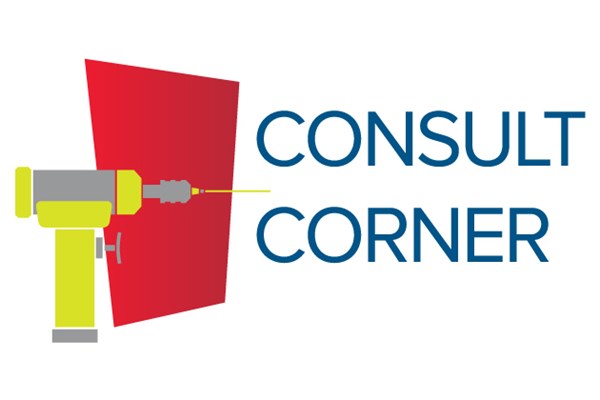EM Resident is pleased to introduce a new column. “Consult Corner” is designed to help you communicate effectively when seeking input from other specialists. In our inaugural column, we speak with Christopher Cosgrove, MD, an orthopedic surgery resident at Washington University in St. Louis.
EMR: What is the most effective way to present an orthopedic consult over the phone?
CC: Let me give you an example: “Mrs. J is a 56-year-old female who presents after a high speed MVC with a closed left midshaft transverse femur fracture. She is neurovascularly intact and has no other injuries. Her medical history is significant only for atrial fibrillation, on warfarin, with an INR of 3.” These basic elements give me enough information to generate immediate guidance regarding further imaging, need for antibiotics, anything that may delay operative intervention (additional injuries, lab abnormalities), and also allow me to triage other pending consults.
EMR: What basic workup would you like completed prior to placing a consult?
CC: With rare exception, plain radiographs of the affected area are an absolute must. Despite how obvious the deformity may be, you and the orthopedic consultant need to generate a radiographic diagnosis prior to the initiation of any treatment plan. Just like a person with crushing substernal chest pain does not get a cardiology consult prior to obtaining an ECG, generally speaking, an orthopedic consult should not be placed prior to obtaining radiographs. This seems silly, but it happens more often than you would think! In the setting of a septic joint rule out, basic labs including a CBC, ESR, and CRP are also helpful.
EMR: What do you consider to be urgent or emergent consultations?
CC: There are very few true orthopedic emergencies. A knee dislocation, especially if there is neurovascular compromise, is something that can be diagnosed clinically and warrants an immediate reduction. Compartment syndrome and acute spine pathologies associated with a neurologic deficit should also prompt an urgent consultation. If there is any neurovascular compromise associated with an extremity injury, this should be communicated with your orthopedic consultant for urgent evaluation after obtaining radiographs. In general, most joint dislocations should be evaluated and reduced on an urgent basis, but once again, not prior to a radiographic diagnosis. Open fractures should be included in the urgent/emergent category because the timely delivery of antibiotics (as soon as they hit the door!) is one of the most critical aspects of their care.
EMR: What are some common procedures that an EM resident should feel comfortable with managing in the community?
CC: Joint dislocations of the shoulder, elbow, hip, knee, and ankle should be part of an emergency medicine physician's skill set. You should also feel comfortable with basic fracture reductions, including distal radius fractures. An EM resident should also be comfortable with applying the appropriate splints for each extremity in a variety of different fracture settings.
EMR: Top 3 ED pet peeves?
CC:
- Consults without X-rays readily available for viewing are a universal pet peeve.
- Digital blocks prior to the consultant seeing the patient. Traumatic hand injuries require a meticulous physical exam. This is important for both documentation and operative planning. All attempts should be made to control the patient's pain with oral/intravenous analgesics until the consultant can record an accurate exam.
- Obtain adequate exposure. Open fractures and other fun surprises can hide behind outside hospital splints. As an emergency provider, you play a critical role in making the right diagnoses and making sure no injury is missed because of inadequate exposure.
EMR: Other pearls for emergency medicine residents?
CC: Get involved with orthopedic procedures early and often. Your orthopedic colleagues should be excited to have a helping hand in the emergency department and may even let you do the entire procedure. Mastering the management of musculoskeletal trauma is all about repetition. You don't want to be in the final few months of your residency when you realize you're not very comfortable reducing or splinting fractures. We know you're busy managing sick patients, but the more you can get involved, the better off you'll be when you are practicing in a setting where an orthopedic consultant may not be as readily available.




